3D Projectors
Understanding 3D Projectors
How does 3D Projection Work?
What are the advantages & disadvantages of 3D?
What equipment do I need to project in 3D?
What projectors do you recommend for 3D?
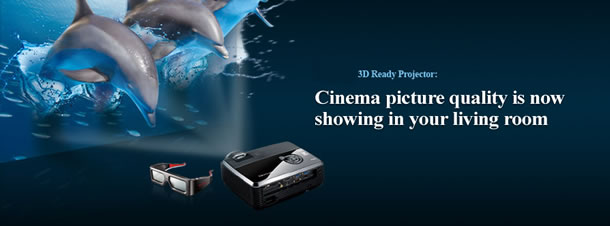
3D technology is nothing new, however in recent years it has evolved and improved significantly, now allowing viewers to enjoy a high quality immersive 3D experience in their own home. When watching a film in 3D the viewer experiences an image with more realistic depth, providing immersion, and enhancing the feeling that you are actually there. Many projectors now include 3D functionality and there is an ever growing library of bluray movies available in the 3D format.
In comparison to a 3D enabled televsion, 3D images from a projector often will offer added realism and a more immersive expensive due to the larger image size. A typical household television is usually around 60", while the most common projection screen is approximately 100-135".
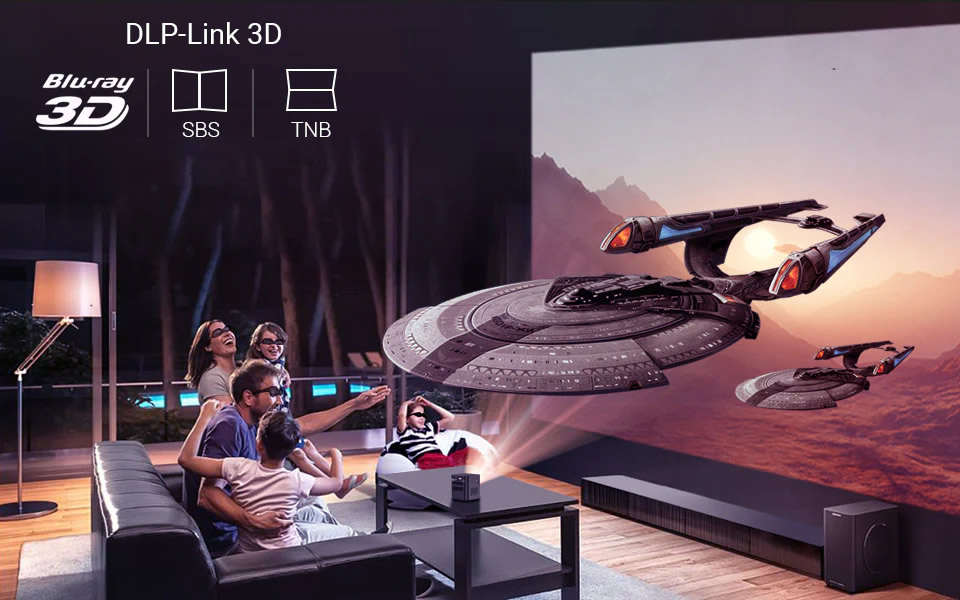
There are many ways that 3D can be achieved but essentially 1 eye must see a different image to the other. With modern home theatre projectors, this is achieved using Active 3D Glasses.
Active 3D glasses are powered glasses the viewer wears. Rather than looking through a simple piece of tinted glass, with active glasses you are looking through an LCD panel. The LCD panel in each eye opens and closes several times a second, so only 1 eye is seeing an image at a time. When a 3D signal is being played on the projector, the projector will then display the left eye image followed by the right eye image several times a second, which the Active glasses will sync with. This is a very generalised description, as there are different 3D technologies, but it gives you an eye how Active 3D Glasses work.
Passive 3D is what is utilised by commercial cinemas, where the user would wear a non-powered (passive) 3D glasses. These glasses are significantly cheaper than Active glasses however a large investment in projector technology is required. For home users you would always be using Active 3D technology rather than Passive (so unfortunately your cheap 3D glasses from the local cinema will not work at home).

- Highly immersive image, feels like you are actually there.
- More image depth and perspective.
- A more special and unique viewing experience.
- Requires the viewer to wear 3D glasses.
- 3D can be a little more expensive due to the cost of glasses and 3D films.
- Some viewers may experience minor eye strain or feel a little dizzy after a long film.

- 1. To start with you will need a 3D compatible home theatre projector. Most home theatre projectors currently feature 3D projection but always check prior to ordering.
- 2. Compatible 3D Glasses. The type of glasses you require will depend on your projector. Generally, DLP type projectors (such as those made by BenQ and Optoma) use DLPLINK type active shutter glasses. Epson on the other hand use Bluetooth or RF type 3D glasses (check your projectors manual to confirm the type).
- 3. A 3D player. This is usually going to be a 3D Bluray player but can also be a computer with a 3D enabled graphics card. At time of writing most mid-range bluray players included 3D capability.
- 4. A 3D video or film. 3D Bluray movies are available online and at most major entertainment retailers. They tend to cost slightly more than a standard 1080p bluray disk but often will come with both the 3D and 2D disks.

3D COMPATIBLE HOME THEATRE PROJECTORS
Optoma HD28e
1080p Full HD
Home Projector
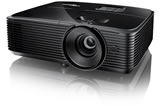
- 3800 ANSI Lumens
- 30,000:1 Contrast
- Best Under $1k!
Optoma HD39HDR
1080p Full HD
Home Projector

- 4500 ANSI Lumens
- 50,000:1 Contrast
- Fast Gaming Modes
Optoma GT1080HDR
1080p Full HD
S/Throw Home Projector
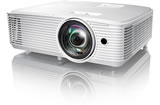
- 3800 ANSI Lumens
- 50,000:1 Contrast
- REC709 Colour
- Short Throw
Optoma GT2160HDR
2160p 4K
S/Throw Home Projector
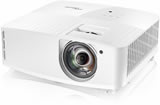
- 4000 ANSI Lumens
- 1,200,000:1 Contrast
- REC709 Colour
- Short Throw
Optoma UHD35+
2160p 4K
Home Projector

- 4000 ANSI Lumens
- 1,200,000:1 Contrast
- Fast Gaming Mode
BenQ X3100i
2160p 4K LED
Home Projector
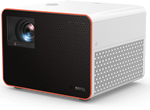
- 3300 ANSI Lumens
- 600,000:1 Contrast
- 100% DCI-P3 Colour
- Fast Gaming Mode
- Android 11 Inbuilt